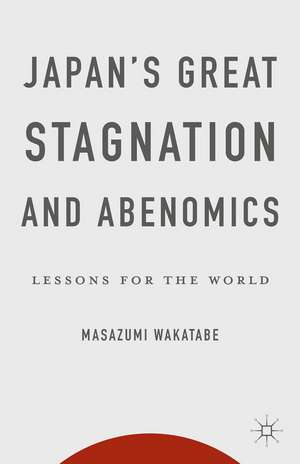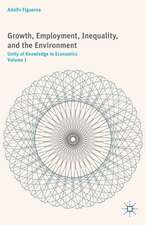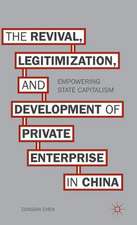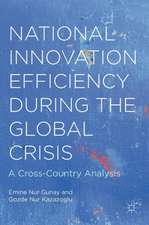Japan's Great Stagnation and Abenomics: Lessons for the World
Autor Masazumi Wakatabeen Limba Engleză Hardback – 23 apr 2015
Japan's Great Stagnation and Abenomics reveals the striking similarities of economic events and policies between the Great Stagnation and the current Great Recession. It also suggests possible dangers ahead and way-outs in the future. This exciting new volume is based on Wakatabe's expertise in economic history and the history of economic ideas and argues that any policy decision is related to cultural ideology. An investigation into the relationship between cultural ideology and policy helps us better understand the policy-making process.
| Toate formatele și edițiile | Preț | Express |
|---|---|---|
| Paperback (1) | 634.82 lei 6-8 săpt. | |
| Palgrave Macmillan US – 19 noi 2015 | 634.82 lei 6-8 săpt. | |
| Hardback (1) | 780.82 lei 6-8 săpt. | |
| Palgrave Macmillan US – 23 apr 2015 | 780.82 lei 6-8 săpt. |
Preț: 780.82 lei
Preț vechi: 952.22 lei
-18% Nou
Puncte Express: 1171
Preț estimativ în valută:
149.43€ • 155.43$ • 123.36£
149.43€ • 155.43$ • 123.36£
Carte tipărită la comandă
Livrare economică 14-28 aprilie
Preluare comenzi: 021 569.72.76
Specificații
ISBN-13: 9781137438843
ISBN-10: 1137438843
Pagini: 209
Ilustrații: XI, 209 p.
Dimensiuni: 140 x 216 x 14 mm
Greutate: 0.41 kg
Ediția:2015
Editura: Palgrave Macmillan US
Colecția Palgrave Macmillan
Locul publicării:New York, United States
ISBN-10: 1137438843
Pagini: 209
Ilustrații: XI, 209 p.
Dimensiuni: 140 x 216 x 14 mm
Greutate: 0.41 kg
Ediția:2015
Editura: Palgrave Macmillan US
Colecția Palgrave Macmillan
Locul publicării:New York, United States
Cuprins
1. Introduction: Once It happened in Japan 2. Thirty Years' Economic Crisis 3. Thirty Years' Intellectual Crisis 4. Shadow of History: What We Could Still Learn From the Great Depression of the 1930s 5. The Future Again? The Assessment of Abenomics 6. Concluding Remarks: Beware of Japanization
Recenzii
“Masazumi Wakatabe have written the best book to date on the Japanese economic crisis and Shinjo Abe’s campaign to resolve it. … it deserves a wide audience among Japan specialists and general readers alike. … The global financial crisis, like Japan’s great stagnation, is a reminder that macroeconomic analysis needs to be informed by economic history and the history of economic thought. Japan’s Great Stagnation and Abenomics is a textbook example of how this should be done.” (Barry Eichengreen, Japanese Journal of Political Science, Vol. 17, 2015)
"The initiative of 'Abenomics' led by Prime Minister Shinzo Abe woke up the Japanese economy, a sleeping lion, to a vigorous growth that drew the attention of international media. Yet, we do not have a systematic account in English of the process by which Abenomics led Japan to recover in a few years after almost two decades of stagnation. Excellently trained in monetary economics and in political economy, Wakatabe provides us an academic study of macroeconomic mechanism, political incentives, and the role of economic ideology behind this magic comeback." - Koichi Hamada, Tuntex Professor Emeritus of Economics, Yale University, USA; Special Advisor to Prime Minister Shinzo Abe
"In this very good, thoughtful analysis focusing on Japan's mediocre economic performance since 1990, Wakatabe stresses the context in which conflicts between a structured view and a macroeconomic view led to major macroeconomic policy mistakes. From this history, he derives monetary lessons for foreign policy makers. He then provides an interim evaluation of Abenomics." - Hugh Patrick, Director, Center on Japanese Economy and Business, Columbia Business School, USA
"The initiative of 'Abenomics' led by Prime Minister Shinzo Abe woke up the Japanese economy, a sleeping lion, to a vigorous growth that drew the attention of international media. Yet, we do not have a systematic account in English of the process by which Abenomics led Japan to recover in a few years after almost two decades of stagnation. Excellently trained in monetary economics and in political economy, Wakatabe provides us an academic study of macroeconomic mechanism, political incentives, and the role of economic ideology behind this magic comeback." - Koichi Hamada, Tuntex Professor Emeritus of Economics, Yale University, USA; Special Advisor to Prime Minister Shinzo Abe
"In this very good, thoughtful analysis focusing on Japan's mediocre economic performance since 1990, Wakatabe stresses the context in which conflicts between a structured view and a macroeconomic view led to major macroeconomic policy mistakes. From this history, he derives monetary lessons for foreign policy makers. He then provides an interim evaluation of Abenomics." - Hugh Patrick, Director, Center on Japanese Economy and Business, Columbia Business School, USA
Notă biografică
Masazumi Wakatabe is Professor of Economics at Waseda University, Japan. Trained as a historian of economics, he has extensively written on economic thought during the past economic crises, and the Japanese economy and economic policy. He has published six books in Japanese, and has published numerous book chapters and academic articles throughout his career in both English and Japanese.














